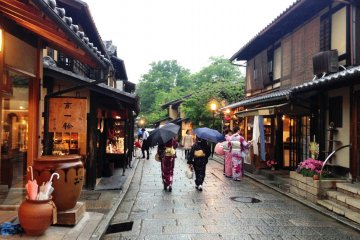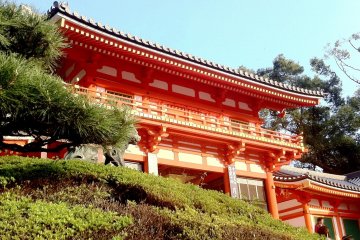Kyoto, the cultural capital of Japan, is home to a multitude of shrines and cultural sites. The prefecture is home to one of the world’s largest collections of UNESCO World Heritage sites. To date, Kyoto currently has 17 different UNESCO-worthy temples and shrines.
No trip to Kyoto can be complete without visiting at least one of these sites. In fact, visitors often find themselves returning — as a day or two is barely enough to cover them all. Thus, we’ve compiled the full comprehensive list of Kyoto’s UNESCO World Heritage sites to help you make the most out of your first (or second) trip to the ancient capital city!
Central Kyoto
1. Nijo Castle

Nijo Castle is one of the most accessible UNESCO spots in Kyoto, being just a short walk from Nijojo-mae Station. The former residence of the Tokugawa shoguns, the sprawling castle grounds are surrounded by a wide moat and massive stone walls. Spanning over 275,000 square metres, Nijo Castle is one of the biggest historic sites in all of Kyoto.
2. Kiyomizudera Temple

One of the most popular sights in Kyoto, Kiyomizudera is famous for its large wooden stage. The Kiyomizu stage is known amongst all Japanese people through a saying; “to jump off the stage at Kiyomizu”, which is equivalent to the phrase “to take the plunge”. Set off early if you wish to have the Kiyomizudera grounds to yourself, as the temple fills up with visitors as the day goes on.
3. Toji Temple
You might recognise Toji Temple from most of the Instagram and Facebook photos taken in #Kyoto. This eye-catching 5-storey high pagoda is a picturesque landmark for both tourists and locals alike. If you're lucky enough to be there on the 21st of each month, make sure to check out the Kobo-san traditional flea market.
4. Nishi Hongan-ji Temple

This elaborate temple is a beautiful example of Momoyama Period (1573-1603) architecture. Nishi Hongan-ji Temple is also famed for its 400-year old Gingko Tree, with a unique structure that makes the tree look as if it's pointing up towards the sky. Located a mere 10-minute walk away from Kyoto station, the headquarter of Shin Buddhism is an easy trip for those staying nearby.
Eastern Kyoto
5. Ginkaku-ji Temple

Although best known as the Silver Pavilion, Ginkaku-ji Temple is not actually plated with silver. However, the elegant temple is still a beautiful example of Japanese landscape architecture. Modelled after the Kinkaku-ji (Golden Pavilion), this serene Zen temple used to be a private villa.
6. Enryaku-ji Temple

Much like most of the UNESCO sites located outside Kyoto city, Enryaku-ji Temple is a great choice for those seeking a quieter environment. Situated on Mt Hiei, visitors can enjoy the aerial view from the scenic cable car ride on the way to the temple.
7. Daigo-ji Temple

Known as the “Temple of Flowers”, this UNESCO site is built atop Daigo-san mountain. A prime viewing spot for fall foliage, Daigo-ji Temple also hosts a cherry blossom viewing party on every second Sunday in April. For admirers of Japanese-style gardens, these pristine temple grounds are not to be missed.
Western Kyoto
8. Saiho-ji Temple
If you’re more of a nature fanatic, Saiho-ji Temple’s main attraction is not the building itself - but the surrounding moss garden. Nicknamed as “Moss Temple”, the area’s sprawling green garden consists of over 120 types of moss. Admission to Saiho-ji is restricted and by reservation only, a regulation passed in order to protect the moss from destruction by overcrowding.
9. Tenryu-ji Temple

Tenryu-ji Temple is the headquarter of the Rinzai School sect of Zen Buddhism in Japan. The temple is famed for its picture-perfect view of the Zen garden during peak fall foliage. Tenryu-ji also offers visitors the chance to experience dining like a monk — enjoy local Zen vegetarian cuisine, or "shojin ryori", at the temple's in-house restaurant.
10. Ninna-ji Temple

Ninna-ji Temple is known among locals for its prime location as a late cherry blossom viewing spot. The temple is home to a host of Omuro Sakura trees, which are the latest blooming cherry trees within Kyoto. Visitors often flock to the area to catch the last glimpse of spring before the short-lived blossom season ends.
11. Ryoan-ji Temple
Unlike the towering pagodas mentioned earlier, Ryoan-ji earned its reputation for its peculiar rock garden. Although their placement appears random, the garden’s 15 rocks are designed and placed very carefully amongst a sea of gravel. The origin of the garden and its creator remains unknown to this day.
12. Kinkaku-ji Temple

Unlike the Silver Pavilion, Kinkaku-ji is actually adorned in gold. The exquisite three-storey Buddhist temple is one of Japan’s iconic sites, with its image beautifully reflected onto the “mirror pond” it stands among. The glistening gold exterior is especially stunning when contrasted among the snow-capped roof in winter.
13. Kosanji Temple

Located amongst the mountains outside Kyoto city, Kosanji temple almost appears to exist in its own world. Best for those who wish to escape the crowds and enjoy the serenity of the secluded forest - Kosanji temple is a perfect choice for a half-day trip from Kyoto.
Northern Kyoto
14. Kamigamo Shrine

Kamigamo Shrine is one of Kyoto’s oldest, with two large red torii gates standing guard at its entrance. Also situated near the river bank, a visit to Kamigamo shrine can be easily combined with sister-shrine Shimogamo-jinja.
15. Shimogamo Shrine

Take a walk among the peaceful surroundings of the Kamogawa and Takanogawa rivers while you make your way to Shimogamo Shrine. Together with sister shrine Kamigamo-jinja, both shrines host one of Kyoto’s three biggest annual festivals on May 15th - the Aoi Matsuri. Visit in summer to catch the firefly-viewing event and horse-riding archery events held here every year.
Southern Kyoto (Uji)
16. Byodo-in Temple

Byodo-in Temple was formerly a Fujiwara villa, its main hall designed to resemble the Buddhist Pure Land or Paradise. Its main hall, the 'Phoenix Hall' or Amida-do, is the last remaining original building from 1053. Enshrined onto the back of a 10-yen coin, the famous view from the Phoenix Hall is not to be missed.
17. Ujigami Shrine

Complete your trip to Uji, a city famed for its green tea, with a visit to UNESCO-certified Ujigami-jinja Shrine. Ujigami-jinja is said to be Japan’s oldest existing Shinto shrine, allegedly built around 1060. Don’t miss the nearby Byodo-in temple and Uji-gawa shrine and make the most out of your day trip from Kyoto.










